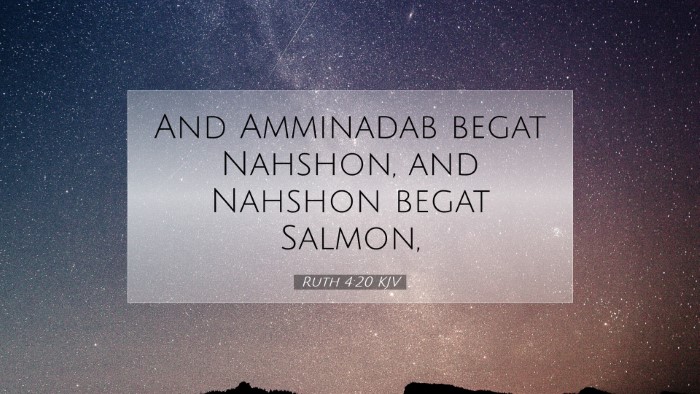Old Testament
Genesis Exodus Leviticus Numbers Deuteronomy Joshua Judges Ruth 1 Samuel 2 Samuel 1 Kings 2 Kings 1 Chronicles 2 Chronicles Ezra Nehemiah Esther Job Psalms Proverbs Ecclesiastes Song of Solomon Isaiah Jeremiah Lamentations Ezekiel Daniel Hosea Joel Amos Obadiah Jonah Micah Nahum Habakkuk Zephaniah Haggai Zechariah MalachiRuth 4:20
Ruth 4:20 KJV
And Amminadab begat Nahshon, and Nahshon begat Salmon,
Ruth 4:20 Bible Commentary
Commentary on Ruth 4:20
The verse of interest, Ruth 4:20, states: "And Amminadab begat Nahshon, and Nahshon begat Salmon."
Contextual Background
The Book of Ruth is a narrative that unfolds during the time of the judges, a period characterized by social chaos and moral decay in Israel. It tells the story of Ruth, a Moabite woman who is adopted into the Israelite community through her loyalty to her mother-in-law Naomi. The genealogy presented in Ruth 4 serves not only to conclude the narrative but emphasizes God's providential care and the integration of gentiles into His redemptive plan.
Insights from Matthew Henry
Matthew Henry emphasizes the significance of genealogies in Scripture. In his view, genealogical records serve to connect God's promises over generations, demonstrating His unwavering faithfulness in the midst of human frailty. He highlights that Amminadab, Nahshon, and Salmon were pivotal ancestors in the lineage leading to King David, and ultimately to Christ, showcasing the unfolding of divine revelation in history.
- God's Faithfulness: Henry notes that the lineage of Ruth into the line of David is a testament to God's faithfulness to His covenant promises.
- Ruth's Legacy: The inclusion of Ruth—a Moabite—illustrates God's plan to include all nations in His redemptive purpose.
Insights from Albert Barnes
Albert Barnes provides theological reflections on this genealogy, stressing its role in demonstrating the importance of familial lineage in Israelite culture. He comments on the names presented, describing each individual and their importance in Israel's history.
- Nahshon: Barnes emphasizes that Nahshon was a notable leader during the Exodus, recognized for his faith and bravery, which further cements God’s providence in establishing leadership during pivotal moments.
- Salmon: Salmon’s marriage to Rahab, who was saved from Jericho, embodies the theme of grace and redemption, affirming that God can use anyone for His purposes.
Insights from Adam Clarke
Adam Clarke delves into the historical context of the names mentioned in Ruth 4:20, highlighting their roles and significance. He recognizes the genealogical lists as crucial for understanding the heritage of Israel and the coming Messiah.
- Genealogical Significance: Clarke points out that the genealogy serves to place Ruth, a gentile, within the very roots of Israel, thus validating her as an integral part of Israel’s patriarchal history.
- Theological Implications: He also notes that these genealogies are essential for establishing the rightful lineage of Jesus Christ, fulfilling the messianic prophecies found throughout the Old Testament.
Theological Reflections
The verse serves as a reminder of God's intricate plans within human history. Each name in the genealogy is not just a name but a story, a testament to God's sovereign orchestration. The mention of Ruth’s place in this lineage profoundly speaks to themes of redemption, inclusion, and divine purpose.
- Redemption: The genealogy presented illustrates redemption’s expansiveness; Ruth entered the covenant people and was redeemed, showing that God’s grace is available to all who turn to Him.
- Inclusion of Gentiles: Ruth’s lineage affirms the reality that God’s salvation extends beyond Israel, prefiguring the New Testament revelations about salvation through Christ for all nations.
Application for Today’s Believer
For modern believers, Ruth 4:20 serves as both an exhortation and an encouragement. It reassures us of the continuity of God's plan through history and urges us to participate in the unfolding story of redemption.
- Faithfulness in Our Lives: Just as Nahshon and Salmon played crucial roles in God's story, believers are reminded that their lives have purpose and significance in God's redemptive plan.
- Embracing Diversity: The inclusion of a Moabite in the lineage empowers us to embrace and reach out to those from different backgrounds, fostering an understanding of the global nature of the Gospel.
Conclusion
Ruth 4:20, while a brief genealogical entry, encapsulates profound truths about God's faithfulness, the nature of salvation, and the inclusion of gentiles into His community. Commentaries by Henry, Barnes, and Clarke provide rich insights into the continuity of God’s work in history and underscore the significance of each name in the genealogical line leading to Christ. As we reflect on this verse, we are invited to recognize our place in God's unfolding story and to participate in His mission of redemption and inclusion.


